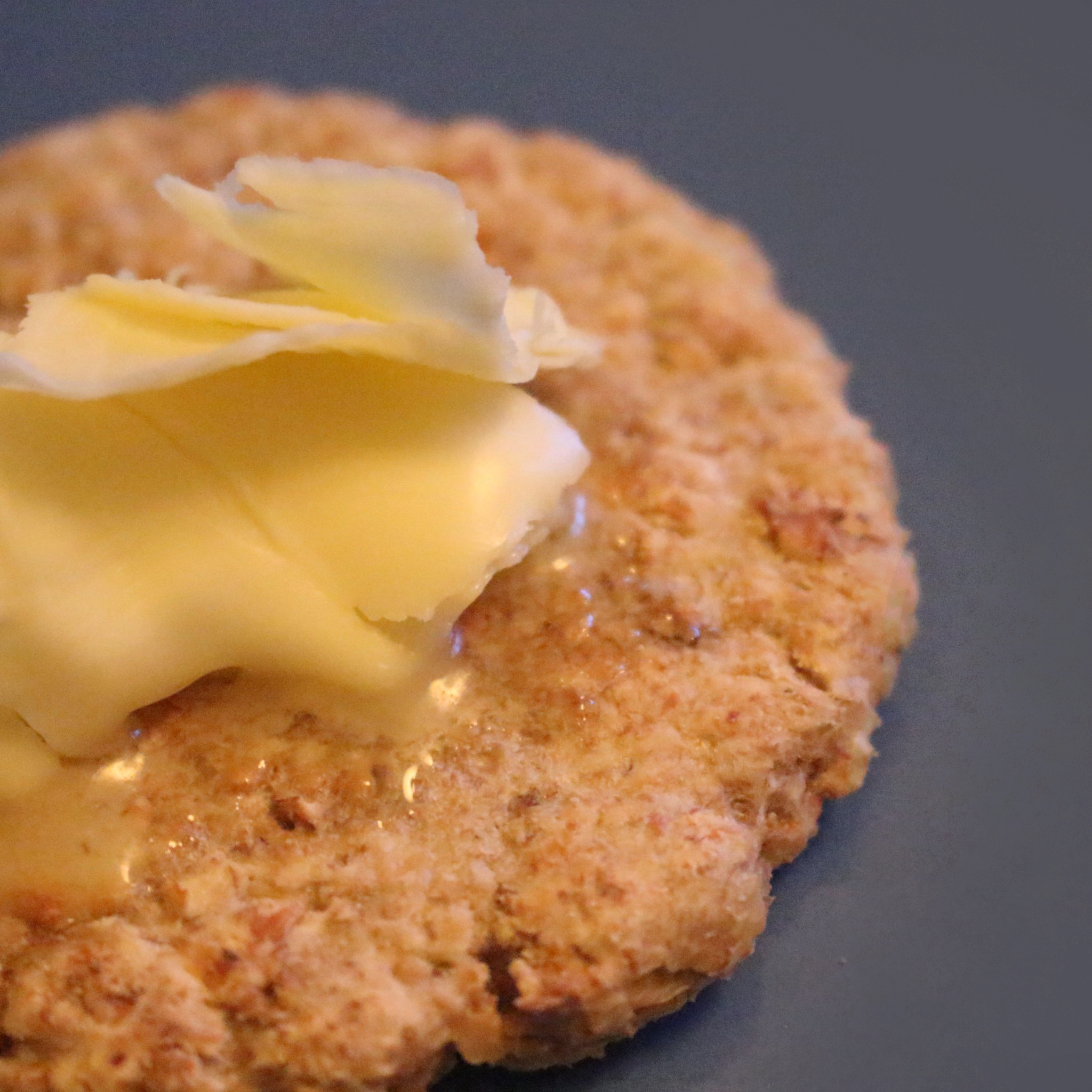 🖨️ Print post
🖨️ Print post
Oatcakes were the one of the staple foods of the Scottish, Welsh, Irish and northern English populations long before the advent of the more modern grain, wheat. The ‘cake’ in their name may make our modern minds think that they are sweet. But they are, in fact, a savoury biscuit/cracker. Traditionally, they were baked on a bakestone or griddle over a fire before being dried in the oven to make them very crisp. They were eaten as is but also often crumbled into a bowl and topped with stock, buttermilk or water.
Being someone who soaks or preferments virtually all of the grains and flour she uses in her kitchen, I was suprised to learn that traditionally oatcakes were made with unsoaked, unfermented oats. The oat grain would have been ground into flour at the local mill, making a medium coarse ‘meal’. This was mixed with warm water and (most often) fat to make a dough.
I love making oatcakes this, traditional way, but I also wanted to come up with a fermented, sourdough version. A lot of people have issues digesting unprocessed grains and that modern science shows us that there are many benefits to the sourdough process.
These days, rolled/flaked oats are more widely available than ground oats, so I use them in this recipe. You’ll need a medium flake – too big and the cakes won’t adhere together, too fine and you’ll loose the beautiful crunchy texture.
The fermentation in these oatcakes is ‘started’ by a sourdough starter, but if you don’t have this, you could use one of the alternatives I suggest. They ferment overnight, so if you’d like these for breakfast, prepare them the evening before. Finally, I cook these in a dry cast iron pan on the hob – imitating how it would have traditionally been done!
Ingredients – makes 8 cakes
- 200g (2 ¼ cups) medium rolled oats (if your oats are too large, you can grind them lightly using a coffee grinder)
- 100g (⅓ cup + 1 tbsp + 1 tsp) non-chlorinated water (chlorine inhibits fermentation)
- 25g sourdough starter (or milk kefir, yogurt, whey – any live bacteria starter) – See this conversion chart
- Pinch of salt
- Optional: Flour for dusting your work surface
Instructions
- Mix the sourdough starter into the water, distributing it well.
- Put the oats into a large bowl and pour over the water/starter mix.
- Stir really well until the water has coated each oat flake.
- Cover and leave in a warm place (ideally 22C/72F). The longer you leave them, the more sour the resulting oatcake will be. I tend to leave mine overnight, but will often let them ferment for two days. If you want to stop the fermentation but aren’t ready to cook the oatcakes you can transfer your bowl to the fridge.
- When ready to cook, preheat your cast iron pan to medium-high.
- Take roughly 1/8 of the oat mixture into hands and ball it together, working it in your hand so that it becomes a pliable dough.
- Place the ball onto your working surface (flour this if you are worried the dough is going to stick) and flatten with the ball of your hand. Work the dough into a circle around 8cm in diameter paying attention to the edge of the circle, pinching it together if it starts to split (it canhelp to use wetted fingers to do this).
- Repeat this process another 7 times, until you have 8 oatcakes.
- Place the cakes onto the hot cast iron pan (I can get 4 into my pan in one go, so do this in 2 batches).
- Cook until golden brown on both sides, flipping half way through.
- Serve them warm. I love to let butter melt into them or top with cheese.


Hello, Is there a way to make sourdough starter without gluten for those with celiac disease?
You could use Kefir or sourmilk for this recipe
Hi,
I have instructions on my site: https://ancestralkitchen.com/2022/03/07/how-to-create-a-gluten-free-sourdough-starter/
Alison
It’s quite easy to use brown rice or sorghum or even white rice (pick 1 and feed it the same flour and some water, and be sure to discard) to make sourdough starter. Lots of good info here: https://ancestralkitchen.com/2022/03/07/how-to-create-a-gluten-free-sourdough-starter/
Is oil needed in the cast iron? If so which do you recommend?
No, the cast iron pan is dry, no fat needed!
I had to add a little more water bc they were sooo dry. They dont have a lot of taste but I slathered them in butter and that helped! I really enjoyed the texture.